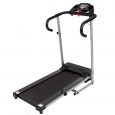Can a Fitness Tracker Help You to Lose Weight?
Fitness Trackers are all the rage right now, with devices from companies like Fitbit selling in huge numbers and being pretty ubiquitous. Wearing a Fitbit is as much a fashion statement as anything else though. This is a way of communicating to the world that you ‘do fitness’ and that you are up to scratch with modern technology.
What’s less clear, is just whether or not a device like this can really help you to lose weight and get into better shape. Read on and we’ll take a look at how something like a Fitbit stacks up in real-world testing and how you can use it to your advantage.
The Good
First, let’s take a look at what fitness trackers do well. The first and most important thing that you will get from your fitness tracker is motivation and awareness. At their most basic, fitness trackers are devices that can count steps (pedometers) and tell you roughly how many calories you might have burned on that basis.
This can then bring home the reality of your current activity levels. Many of us will be shocked for instance at just how little we move during the weekends. Those who work in offices and drive in in the mornings like equally find that they actually don’t move much Monday-Friday.
Seeing this reality written in plain English can make it hard to deny and can encourage you to move a little more and to increase your general activity levels.
This gets even more powerful when you consider the social elements that many fitness trackers come with. A lot of fitness trackers will also let you see how your friends, family and partner are doing in terms of their fitness goals – or to challenge them to see who can move the most in a set amount of time. This too can be an excellent tool for encouraging more activity and getting you to head outside and move more.
Then there are the additional tools and features – things like being able to follow guided workouts and HIIT routines for instance.
The Bad
There are downsides to fitness trackers too however. The first is that they are not usually particularly accurate. Heart rate monitoring is only possible to a degree if you aren’t wearing a chest strap and even then, it is only somewhat correlated with calorie burn.
Many activities can’t be picked up by a fitness tracker at all and while the notion of making sure you burn more calories than you consume (tracked through a fitness tracker and diet app like MyFitnessPal), this can also be an overly simplistic way to monitor your diet that doesn’t take into account such things as your micronutrients or your hormonal balance.
In short, a fitness tracker is a fantastic tool for helping with your weight loss and it can be very useful. However, it is also important not to rely on them or to perceive them as any kind of ‘silver bullet’ that will help you to magically lose all your weight.
Recommended Fitness Trackers















[…] try and fail to lose weight. The latest statistics suggest that just 35% of people who attempt to lose weight are successful in the long […]